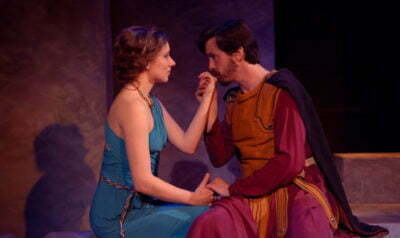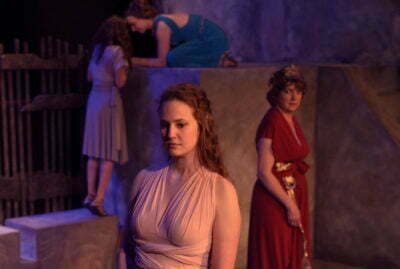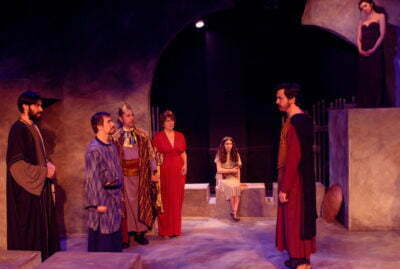Tiger at the Gates

By Jean Giraudoux
Translated by Christopher Fry
Directed by John Arthur Lewis
Produced by Promethean Theatre Ensemble, Chicago
Artists Show Promise with Challenging Piece
Jean Giraudoux’s 1935 play The Trojan War Will Not take Place, which was retitled Tiger at the Gates when it was translated into English by Christopher Fry, is a dense neo-classical work which covers all sorts of issues relating to war and its place in myth. Along with its complex monologues and fantastical images, the piece is a bold but logical choice for Promethean Theatre Ensemble, a group which makes simple staging and intellectually rigorous stories its mission. Although there are some predictable hiccups in this production, I found it successfully communicated the story and message, and is a praise-worthy accomplishment.
We begin shortly before the Trojan War, with the prince Hector (Jared Dennis) having just returned from a different campaign and weary of slaughter. His wife Andromache (Heather Smith) hopes to have him back for good this time, and is irritated by Hector’s sister Cassandra’s (Jamie Bragg) assertion that conflict never ends. But there is cause for a new one: Hector and Cassandra’s brother Paris (Nick Savin) has just arrived with the married Greek queen Helen (Michelle Oliver), and the whole city is enraptured with their affair. Sensible and averse to combat, Hector sees this as a foolish reason to court Greek anger, but the Trojan intellectuals think differently. Whatever harm war does, they believe, it also cultivates the best qualities in men. And though Helen is in herself an incredibly poor reason for hostilities, it is through symbols that people acquire the values which make life grand, divine even. And Helen is a very appealing symbol. If Hector is to prevent war, he will have to silence or side-line not Paris and Helen themselves, but the fanatics who insist on escalating this incident. Of course, the journey holds more surprises than the ending.
As Hector, Dennis broods and conveys the frustration of being a realist in a city that seems to have gone mad. He’s a likable figure, and gives a harrowing account of watching his comrades die from their wounds. Dennis finds a way of blending these personal moments with other, more rhetorical speeches that keep with the neo-classical idea of a hero as beyond common sympathy. There have been many scenes over the centuries of Hector debating the wisdom of the war, but Giraudoux managed to put his own stamp on it. My favorite performance was Oliver’s as Helen. She’s a mysterious character, with her own prophetic powers to rival Cassandra’s. But while Giraudoux conceives of Cassandra as cynical and pragmatic, Helen’s visions of some possible futures in color and others in greyscale goes supports the poet Demokos’s (Brendan Hutt) opinion that fate and the gods want human affairs to be interesting and therefore bloody. Oliver’s Helen is not vindictive or ignorant; she rightly recognizes herself as an agent of destiny and is therefore detached from those around her. She comments at one point that she doesn’t value pity or love, but accepts unhappy people as equals. Though the words are matter-of-fact, Oliver’s delivery is full of facial and vocal subtleties that indicate a cunning and penchant for philosophy this character is not usually associated with.
Those two excellent performances aside, the rest of the cast does well, although the only major flaw in the show is that some of their voices aren’t quite calibrated for the space. Jeremiah Barr and Kaitlyn Grissom’s faux-cement set design is visually striking, but also created some reverberation problems. So while some actors were overly loud, others were too soft or mumbled. But that wasn’t nearly bad enough to destroy the play. Each of their dialogues regarding which ideals are proper were understandable, and those discussions are interesting and still relevant. One such example is Demokos’s praise for Trojan women as the vessels of purity and love which inspire Trojan men to do such heroic actions in their defense as engaging in unnecessary wars. The women naturally roll their eyes at how such idealizations lead to unintended negative consequences for both sexes, but most of the men are swept up in this absurd need to raise things above the mundane. The actors also provide emotional nuance to characters who come with a lot of baggage. These were as human a Paris and Cassandra as I’ve ever encountered, which alone makes the performance valuable. Fans of mythology will enjoy seeing ideological clashes with such humanistic grounding. This company did well by taking a risk, and deserves support.
Recommended
Jacob Davis
[email protected]
Reviewed April 2, 2015
For more information, see Tiger at the Gates’s page on Theatre in Chicago.
Playing in The Athenaeum Theatre, 2936 N Southport Ave, Chicago. Tickets are $22; to order, call 773-935-6875 or visit prometheantheatre.org. Plays Thursdays through Saturdays at 7:30 pm and Sundays at 2:00 pm through April 25. Running time is two hours and twenty minutes with one intermission.


